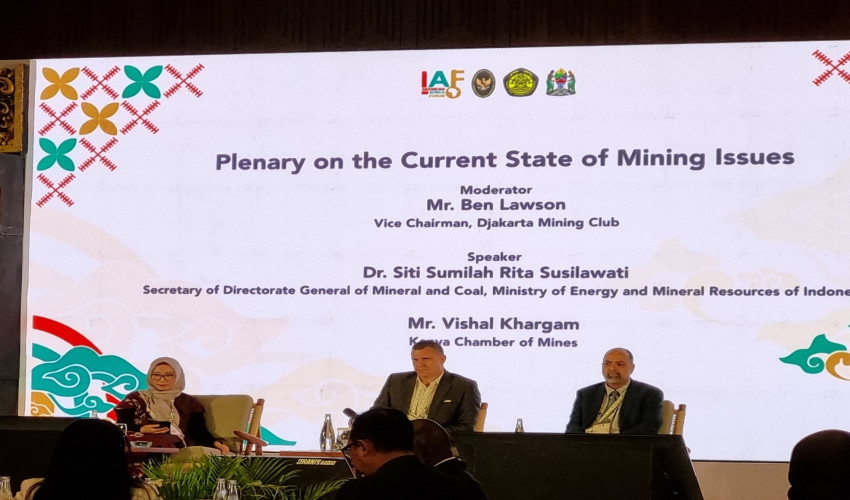Secretary of the Directorate General of Mineral and Coal at the Ministry of Energy and Mineral Resources , Dr. Siti Sumilah Rita Susilawati (left) delivering a presentation on government efforts in formulating mining and downstream regulations during the plenary session on mining issues, Wednesday 3 September 2024 in Nusa Dua, Bali. (Photo: Ministry of Foreign Affairs)
Badung, 4 September 2024 – The government of Indonesia, together with associations in the mining sector, organized the "International Workshop on Downstream Mining with Value Added and Critical Mineral Resources Indonesia-Africa" on the sidelines of the 2nd Indonesia-Africa Forum (IAF), Tuesday, 3 September in Nusa Dua, Bali.
The event was opened by the Director of Pacific and Oceania Affairs at the Ministry of Foreign Affairs (MOFA) of Indonesia, Adi Dzulfuat, and the Deputy Assistant for Maritime Security and Resilience at the Coordinating Ministry for Maritime Affairs and Investment of Indonesia, Adriani Kusumawardani.
Adi Dzulfuat emphasized that it is necessary to have sustainable mining transformation which considers environmental protection strengthening and provides greater benefits for local communities.
On this occasion, Adi stated that the challenge currently faced by Indonesia is how to minimize the negative impact of mining on the environment. "As well as optimizing the value of the mining itself," he said.
Meanwhile, Adriani added that Indonesia is currently committed to implementing value-added downstream mining for high-economic value commodities. According to her, this can be applied in African countries with similar principles.
"The value-added downstream mining process for critical minerals is very beneficial for Indonesia, and it can be applied in African countries iwhich has abundant resource of minerals," explained Adriani.
The discussion session reviewed various mining issues in Indonesia and Africa. It also saw discussions on effective multi-stakeholder collaboration in the mining sector, as well as sustainable and responsible mining strategies based on ESG (Environment, Social, Governance) principles.
The workshop began with a Plenary Session by the Secretary of the Mineral and Coal Directorate General at the Ministry of Energy and Mineral Resources , Dr. Siti Sumilah Rita Susilawati, and the Chairman of the Mining Chamber of Kenya, who is also an Executive Board Member of the Artisanal and Small-Scale Mining Association of Kenya (ASMAK), Vishal Khargam.
Rita extensively covered the role of the Indonesian government in formulating various regulations and strategies for mineral downstreaming to increase value-added as well as strategies to attract investment in the mineral mining sector in Indonesia. Meanwhile, Vishal discussed the management of artisanal mining by the Government of Kenya, which has partnered with Indonesia to build a Responsible Mining Community.
Panel I, "Optimizing Downstream Mining: Enhancing Value and Efficiency," presented CEOs of PT Freeport, PT Vale, and the Ministry of Mineral Resources of Mozambique as speakers. They raised issues such as environmental rehabilitation, global cooperation, and energy transition in the mining sector.
Panel II, "Collaborative Strategies for Securing Critical Mineral Supply," featured PT Antam and PT Trinusa Resources, which explained potential mining collaborations, such as successful mining operational practices in Indonesia, especially for gold, copper, and nickel.
On this occasion, the CEO of Global Renaissance-Zimbabwe, the Chairman of the Artisanal and Small-Scale Mining Association of Kenya (ASMAK), and the Director of Mining and Metals APAC DSS+ also discussed the potential for cooperation and investment in downstream mining and critical mineral resources in their respective countries.
The event was closed with presentations from the Deputy Assistant for Investment Acceleration Strategy and Policy at the Coordinating Ministry for Maritime Affairs and Investment of Indonesia, Ferry Akbar Pasaribu, and the Chairman of the Djakarta Mining Club, Mangantar S. Marpaung.
As a follow-up, Indonesian stakeholders who attended the workshop committed to strengthening cooperation with African country partners through G2G (government-to-government), G2B (government-to-business), and B2B (business-to-business) mechanisms.
The series of workshops held as a side event of the 2nd IAF was attended by mining stakeholders from Indonesia and African countries, including Kenya, Mozambique, Zimbabwe, Tanzania, and others.
This event aims to enhance understanding of various regulations in the mining sector, opportunities, challenges, and strategies to improve the value chain of critical minerals between Indonesia and Africa.
It is expected that various potential mining sector collaborations between Indonesia and Africa will become more open. Additionally, a mutual understanding regarding incentives, regulations, and relaxations prepared by the government to attract investors will be achieved, including discussions on sustainable mining practices by emphasizing social, economic, and transparent management aspects.
The event was attended by representatives from the Coordinating Ministry for Maritime Affairs and Investment of Indonesia, the Ministry of Foreign Affairs of Indonesia, the Ministry of Energy and Mineral Resources of Indonesia, the Djakarta Mining Club, the Indonesian Committee for Mineral Reserves (KCMI), as well as government representatives and business circles in the mining sector from both Indonesia and African countries. (MOFA/TR/Elvira Inda Sari/SW/PR).
***
For more information, please contact:
Director for Information and Media Services, Ministry of Foreign Affairs - Hartyo Harkomoyo (0811831899)
Get more information at https://infopublik.id/kategori/hlf-msp-iaf, https://media.msp-iaf.id/, and https://s.id/msp-iaf
Tag:
